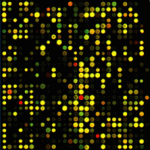Genomics
|
24 january 2015 06:01:49 |
| 2Transcriptomic characterisation and genomic glimps into the toxigenic dinoflagellate Azadinium spinosum , with emphasis on polykeitde synthase genes (BMC Genomics) |
|
Tweet Background:
Unicellular dinoflagellates are an important group of primary producers within the marine plankton community. Many of these species are capable of forming harmful algae blooms (HABs) and of producing potent phycotoxins, thereby causing deleterious impacts on their environment and posing a threat to human health. The recently discovered toxigenic dinoflagellate Azadinium spinosum is known to produce azaspiracid toxins. These toxins are most likely produced by polyketide synthases (PKS). Recently, PKS I-like transcripts have been identified in a number of dinoflagellate species. Despite the global distribution of A. spinosum, little is known about molecular features. In this study, we investigate the genomic and transcriptomic features of A. spinosum with a focus on polyketide synthesis and PKS evolution.
Results:
We identify orphan and homologous genes by comparing the transcriptome data of A. spinosum with a diverse set of 18 other dinoflagellates, five further species out of the Rhizaria Alveolate Stramelopile (RAS)-group, and one representative from the Plantae. The number of orphan genes in the analysed dinoflagellate species averaged 27%. In contrast, within the A. spinosum transcriptome, we discovered 12,661 orphan transcripts (18%). The dinoflagellates toxins known as azaspiracids (AZAs) are structurally polyethers; we therefore analyse the transcriptome of A. spinosum with respect to polyketide synthases (PKSs), the primary biosynthetic enzymes in polyketide synthesis. We find all the genes thought to be potentially essential for polyketide toxin synthesis to be expressed in A. spinosum, whose PKS transcripts fall into the dinoflagellate sub-clade in PKS evolution.
Conclusions:
Overall, we demonstrate that the number of orphan genes in the A. spinosum genome is relatively small compared to other dinoflagellate species. In addition, all PKS domains needed to produce the azaspiracid carbon backbone are present in A. spinosum. Our study underscores the extraordinary evolution of such gene clusters and, in particular, supports the proposed structural and functional paradigm for PKS Type I genes in dinoflagellates. |
| 102 viewsCategory: Genomics |
 Recent progress in understanding transcription factor binding specificity (Briefings in Functional Genomics and Proteomics) Recent progress in understanding transcription factor binding specificity (Briefings in Functional Genomics and Proteomics)Age dependent changes in the LPS induced transcriptome of bovine dermal fibroblasts occurs without major changes in the methylome (BMC Genomics) 
|
| blog comments powered by Disqus |
MyJournals.org
The latest issues of all your favorite science journals on one page
The latest issues of all your favorite science journals on one page



